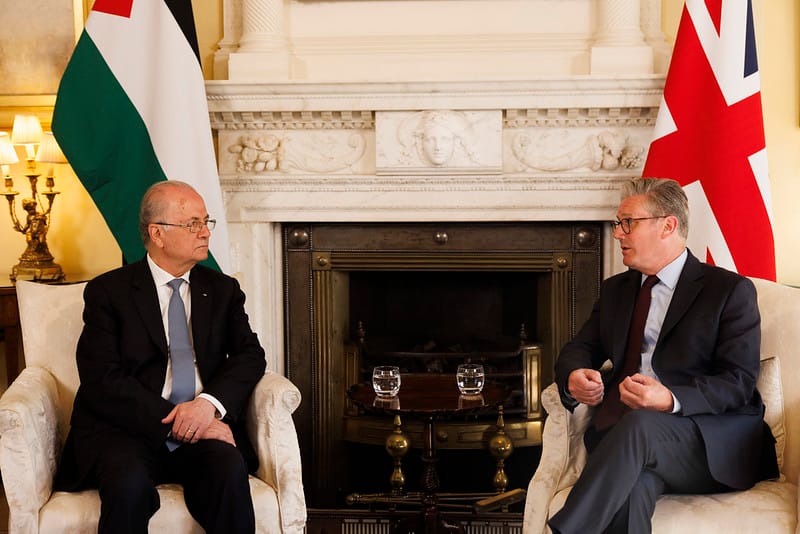Labour is winning back Jewish voters, but at what cost?
An anti-racism that is selective is no anti-racism at all.

Ahead of the general election next week, a new survey conducted by the Jewish Policy Research institute (JPR) suggests that Labour now leads the Conservatives among UK Jews. The poll, which covered over 2,700 respondents, shows that 46% of Jews in the UK intend to vote for Starmer’s party on 4 July, compared to 30% who plan to vote Conservative.
The JPR poll also underscores the diverse nature of the Jewish vote, with nearly 30% of Jews under 30 intending to vote for a party other than Labour, Conservative, or Liberal Democrat. Interestingly, UK Jews are more likely to vote Green and less likely to vote Reform or Liberal Democrat than the general population. Less surprising is the finding that voting intentions hinge heavily on denomination, with support for the Tories still strong among the Orthodox, while Progressives and unaffiliated Jews lean heavily towards Labour.
The Jewish vote remains nuanced, and one should be cautious about over-interpreting a single poll (a smaller Survation survey showed the Tories leading Labour among Jews by 9 points). The surge in Jewish support for Labour may simply reflect broader, non-Jewish fatigue with the Tories rather than genuine enthusiasm for Starmer.
It’s nevertheless clear that there’s been a significant shift in Jewish feeling towards Labour since Jeremy Corbyn’s tenure and the 2019 election, when support plummeted to just 11%. This nadir is mostly attributed to the widely held but deeply questionable view – one stoked enthusiastically by Britain’s establishment media – that Labour under Corbyn was rife with antisemitism. Starmer’s supporters, like those in the Jewish Labour Movement, will argue that this polling is a vindication of his efforts to stamp out that antisemitism, including by expelling Corbyn himself, re-legitimising Labour’s claim to be an anti-racist party.
But that is not the whole story. The notion that Starmer’s allies have done a stellar job of cleansing the party of anti-Jewish hatred is troubled by the fact that their expulsions have often targeted Jews: left-wing Jewish group Jewish Voice for Labour estimates that Jewish members of the Labour Party have been five times more likely to face antisemitism charges than non-Jewish counterparts. One of the group's co-founders, Naomi Wimborne-Idrissi, the only elected Jewish member of Labour’s national executive committee, was expelled on her 70th birthday after being suspended on the flimsy grounds of association with a proscribed group at a meeting a year earlier.
In reality, the characteristic that has often united those expelled, suspended, barred from standing or re-standing for Labour in recent years on various grounds, whether they’re Jewish or not, is a socialist and anti-imperialist political outlook. Such purging has gone into overdrive since 7 October, with Jews again feeling its sharp end: Jewish Lambeth councillor Martin Abrams, for example, was suspended in February for daring to support a ceasefire in Gaza. Gentile MPs and candidates allied to Starmer’s business-friendly leadership, on the other hand, have been allowed to make jokes about ‘silver shekels’ and accuse certain Jews of having ‘abandoned their identity’ and receive at most a slap on the wrist.
As I warned in the early stages of Starmer’s leadership, nothing about this approach helps combat the real problem of prejudice in Labour. This was made evident in the 2022 report by Martin Forde KC, who was appointed by Starmer to investigate claims of bullying, racism, and sexism within the party. Forde's report found that Labour had established a "hierarchy" of racism, wherein allegations of anti-black racism and Islamophobia were treated less seriously than those of antisemitism. Instead of engaging constructively with these findings, Labour recently threatened legal action against Forde for “acting against the party’s interest”.
Fast forward two years, and the callous mistreatment of veteran MP Diane Abbott and Chingford and Woodford Green candidate Faiza Shaheen demonstrates that that hierarchy is alive and kicking. Taken together with the treatment of left-wing Jewish members, it’s evident that an opposition to bigotry in principle is not what has motivated Starmer’s methods. Starmer is less concerned about making Labour welcoming to minorities and more concerned about making it welcoming to the conservative political establishment – and the conservative political establishment has in turn embraced him, more than willing to ignore the increased expulsion of Jewish members and the accusations of racism from other minority groups if they come alongside a return to the pragmatic, grown-up politics that continues to impoverish a growing proportion of the population.
While Jewish media outlets reported on the JPR poll this week, others recounted the anger facing Starmer over his singling-out of Bangladeshi immigrants at a live-streamed interview event with the Sun newspaper. It was the kind of comment that might have just as easily been made about Eastern European Jews a century before — and may well be made about Jews again in the future, when Jewish fear is no longer useful. If Labour wins on 4 July, many will celebrate its transformation, possibly citing victories in Jewish constituencies as evidence of the party's progress. But it remains a fact that antisemitism does not exist – and cannot be fought – in a silo; that an anti-racism that is selective is no anti-racism at all. ▼
Correction: An earlier version of this article stated that the group Naomi Wimborne-Idrissi was expelled from Labour for associating with was not proscribed at the time of the association. This was not the case and the article has been amended.
Aron Keller is an editor at Vashti.
There’s no corporation or big advertisers behind Vashti – we're a workers' cooperative and rely on small donations to keep running. Support our journalism to help break the consensus.
To donate once, click here. To donate monthly, click here.
Author
Aron Keller is an editor at Vashti.
Sign up for The Pickle and New, From Vashti.
Stay up to date with Vashti.



